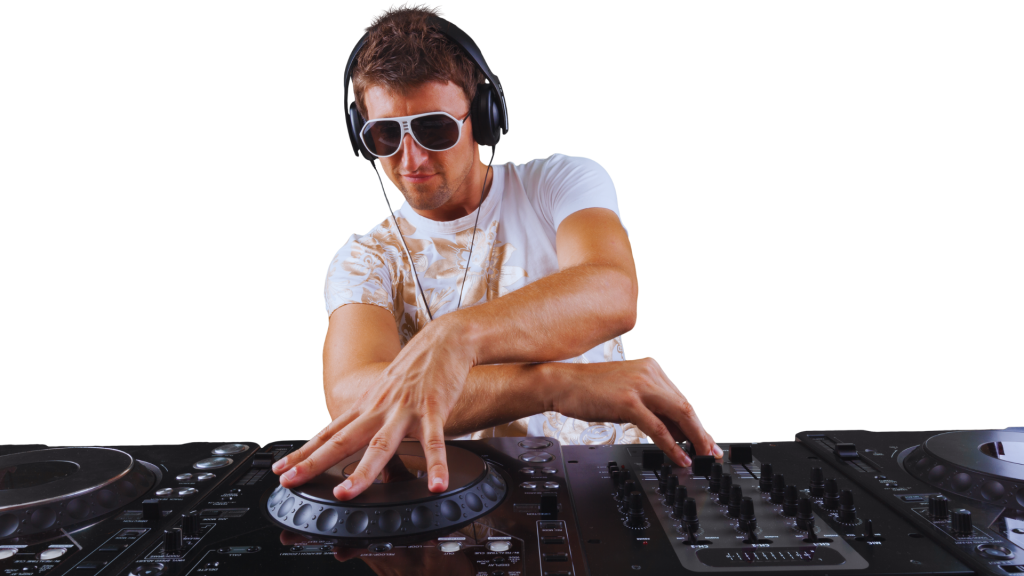Becoming a DJ requires more than just a passion for music; it involves mastering the art of mixing tracks, developing a unique style, and understanding the dynamics of live performance. The journey starts with learning the technical skills of beatmatching and utilizing DJ equipment effectively, which are essential for creating seamless transitions between songs.
Aspiring DJs should also explore various genres of music to broaden their repertoire, as this knowledge allows for creative mixing and caters to diverse audiences. Building a strong personal brand through social media and networking within the music community can significantly enhance visibility and opportunities in this competitive field.
Ultimately, dedication and practice are key to honing skills and achieving success as a DJ. Engaging with local scenes and performing at events can provide invaluable experience, helping to establish confidence and a loyal fanbase.
Fundamentals of DJing
To become a skilled DJ, you must grasp the essential tools and techniques required to create engaging mixes. This includes understanding equipment, mastering music mixing, and learning key performance skills.
Understanding the DJ Equipment
A DJ’s setup typically consists of turntables, a DJ controller, and a mixer. Turntables are used for playing vinyl records, while DJ controllers allow seamless interaction with DJ software.
The DJ mixer helps blend audio sources and adjust volume levels. Familiarity with these components is crucial for smooth operation. Additionally, various software options, such as Serato and Traktor, enhance control and provide advanced features for track manipulation.
You must have an understanding of how every piece of equipment can greatly influence a DJ’s performance.
Learning the Basics of Mixing Music
Mixing music involves combining tracks seamlessly to create a cohesive sound. Key concepts include understanding song structure and identifying elements like tempo and key.
DJs must learn to use EQ (equalization) to balance frequencies. This ensures tracks complement each other without clashing.
Practicing transitions between songs using techniques like fading and looping also enhances mixing skills. While exploring genre-specific styles, DJs can develop unique approaches to their mixing, making their sets memorable and engaging.
Mastering Beatmatching and Scratching Techniques
Beatmatching is the process of aligning the tempos of two tracks. This skill is essential for smooth transitions. DJs can practice manually adjusting pitch faders or utilize software that offers sync features.
Scratching involves manipulating the record or jog wheel to create rhythmic sounds. Various techniques, including the baby scratch and transformer scratch, can add flair to sets.
Both skills require consistent practice and patience. Developing a personal style through these techniques allows a DJ to stand out and connect with the audience on a deeper level.
Building Your Music Arsenal
A well-curated music arsenal is essential for any aspiring DJ. This includes developing a unique music selection, organizing the collection effectively, and understanding current digital tools available.
Developing a Unique Music Selection
Creating a distinctive music selection allows a DJ to carve out their niche. It’s crucial to explore diverse genres and subgenres to discover personal preferences.
- Hub Genres: Consider starting with mainstream genres such as house, techno, or hip-hop.
- Niche Genres: Integrate less popular styles like ambient, chillwave, or experimental sounds to stand out.
Listening to various artists and keeping a pulse on trending tracks can also help shape this selection. Platforms like Spotify, SoundCloud, and Beatport provide valuable insights into current hits and underground tracks.
Organizing and Expanding Your Music Collection
An organized music library is vital for performance efficiency. Using software like Rekordbox, Traktor, or Serato allows for categorization and quick access.
- Folder Structure: Create folders based on genres, moods, or BPM to streamline searchability.
- Playlists: Curate playlists for specific events or vibes, enhancing set planning.
Consistently expanding the collection is equally important. Research and purchase new tracks regularly. Attending local music events and festivals can introduce new sounds, enriching the library and keeping it fresh.
Advancements in Digital Music and DJing
Digital technology has transformed DJing, making it easier to access and manipulate music. A Digital Vinyl System (DVS) allows DJs to use traditional turntables with digital files.
- Software Platforms: Tools like Virtual DJ and Serato offer innovative ways to mix and blend tracks. They provide features such as beatmatching and effects, enhancing creativity.
Understanding the basics of music theory can also benefit DJs. It helps in arranging sets and creating harmonious transitions. Utilizing these advancements equips DJs with the necessary skills to elevate their performances.
Leveraging DJ Technology
DJ technology enhances the skills and creativity of a DJ. By effectively utilizing controllers, software, and various techniques, they can produce a unique sound that stands out.
Exploring DJ Controllers and Mixers
DJ controllers and mixers form the backbone of modern DJ setups. A DJ controller integrates various features, including jog wheels, faders, and performance pads, allowing for fluid mixing. Popular options include the Native Instruments Traktor Kontrol and Pioneer DDJ series.
Mixers, such as the Allen & Heath Xone or DJM series, provide essential audio routing and mixing capabilities. Many DJs prefer all-in-one DJ systems like the Numark Mixtrack to streamline their setups.
Furthermore, a Digital Vinyl System (DVS) allows DJs to use traditional turntables with digital audio, enhancing their versatility.
The Role of Software in DJing
Software is crucial for maximizing the DJ experience. Programs like Traktor Pro, Serato DJ Pro, and Djay Pro offer intuitive interfaces and robust features. Users can access library management, beatmatching, and effects directly within these platforms.
These software applications provide tools for automating mixing and crucial functions like syncing tracks. They also support various hardware controllers, expanding their functionality.
The choice of software often influences the DJ’s style and approach, making proficiency in one or more options essential for growth.
Harmonic Mixing and Effects Usage
Harmonic mixing is a technique that allows DJs to transition between tracks in compatible keys. By understanding music theory and using tools like Mixed In Key, DJs can create smoother transitions, enhancing the overall listening experience.
In addition, effects play a significant role in professional sets. DJs use effects such as reverb, delay, and filters to add depth and energy to their mixes. These effects can create tension and release, making the performance more engaging.
Maximizing these elements, a DJ can truly elevate their performances and captivate their audience.
Navigating the DJ Career Pathway
A successful DJ career requires strategic planning and dedication. Building a following through networking, honing skills, and exploring diverse opportunities are essential for anyone aspiring to excel in this field.
Building a Following and Networking
To establish a career as a DJ, building a fan base is critical. Engaging with the audience is the first step. Social media platforms like Instagram and TikTok are effective for sharing mixes and connecting with fans.
Networking is equally important. Attending music events, collaborating with other DJs, and participating in online forums can open doors. Networking with club owners and event organizers can lead to gigs.
Key actions include:
- Joining local DJ groups
- Attending industry events
- Utilizing social platforms for engagement
Persistence in these efforts can lead to opportunities and increased visibility within the music community.
Honing Your Craft and Marketing Yourself
Mastering the DJ skills is a continuous process. Practicing mixing techniques, understanding beatmatching, and experimenting with various music genres are essential.
In addition to honing skills, effective marketing strategies will enhance visibility. Creating a professional press kit, which includes a bio, mixes, and contact information, can be beneficial. Also, you can enhance your online presence with a new personal website. Building one can serve many functions, such as showcasing your extensive portfolio and allowing potential clients to contact you. However, if coding isn’t your forte, you might be wondering how to plan your new website. The good news is that you don’t have to do it alone – you can always consult professional web designers to help you in that regard.
Utilizing social media for self-promotion is crucial. Regularly posting content and engaging with followers builds a brand.
Marketing tips include:
- Leveraging local media for interviews
- Offering free mix downloads for promotion
- Conducting DJ workshops to connect with aspiring DJs
Exploring Various DJ Opportunities
A DJ’s career can take many forms, each offering unique experiences. Club DJs typically perform at nightclubs, while mobile DJs cater to events like weddings and corporate functions. This versatility allows for a broader audience.
Radio DJs have the opportunity to reach listeners through broadcasts and can influence music trends.
Additionally, becoming a DJ/producer can amplify career potential. By creating original music, DJs can gain recognition and diversify income streams.
Exploring these opportunities requires adaptability and openness to various experiences. Understanding the specific requirements for each type of DJ work can lead to informed decisions and successful engagements.

